Click on images to enlarge
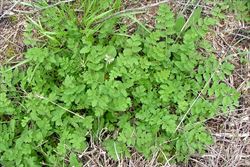
habit (Photo: Sheldon Navie)
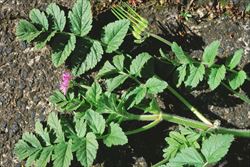
stem and compound leaves (Photo: Greg Jordan)
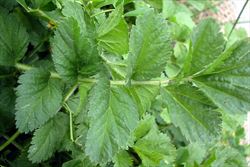
close-up of leaf with several toothed leaflets (Photo: Sheldon Navie)
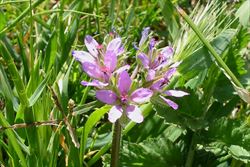
flower cluster (Photo: Sheldon Navie)
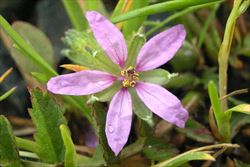
close-up of flower (Photo: Greg Jordan)
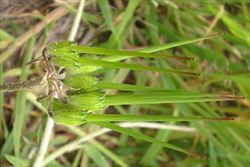
close-up of immature fruit (Photo: Sheldon Navie)
Scientific Name
Erodium moschatum (L.) L'Hér.
Synonyms
Geranium cicutarium L. var. moschatum L.Geranium moschatum L.
Family
Geraniaceae
Common Names
filaree, heron's bill, musk clover, musk filaree, musk heron's bill, musk stork's bill, musk storksbill, musky crowfoot, musky heron's bill, musky heron's-bill, musky stork's bill, musky storksbill, storksbill, white stemmed filaree, white-stem filaree, whitestem filaree, white-stem storksbill, white-stemmed filaree
Origin
Native to western and southern Europe (i.e. the Netherlands, France, Portugal, Spain, Albania, Greece, Italy and Yugoslavia), the Azores, the Madeira Islands, the Canary Islands, northern Africa (i.e. northern Algeria, northern Egypt, northern Libya, Morocco and Tunisia) and western Asia.
Naturalised Distribution
Widely naturalised in southern and eastern Australia (i.e. in south-eastern Queensland, eastern and southern New South Wales, the ACT, Victoria, Tasmania, in many parts of South Australia and in the southern and south-western parts of Western Australia.
Also naturalised on Norfolk Island and in many other parts of the world.
Notes
Musky storksbill (Erodium moschatum) is widely known as a common weed of gardens, roadsides, disturbed sites, waste areas, crops, and pastures. However, it also grows in natural areas, such as grasslands and open woodlands, and is sometimes regarded as an environmental weed in Victoria. It appears on some local and regional environmental weed lists in this state (e.g. in Banyule Shire and in the Goulburn Broken Catchment), is an invasive weed of woodlands on granitic hills, and is also present in conservation areas (e.g. Brisbane Ranges National Park).
Musky storksbill (Erodium moschatum) has also been described as an invasive coloniser of grasslands in South Australia, and is widespread in conservation areas in this state (e.g. Cleland Conservation Park, Aldinga Scrub Conservation Park, Coorong National Park, Belair National Park and Para Wirra Recreation Park). It has also been recorded in conservation areas in Tasmania (e.g. Greens Beach/Kelso Coastal Reserve and Tasman National Park).

